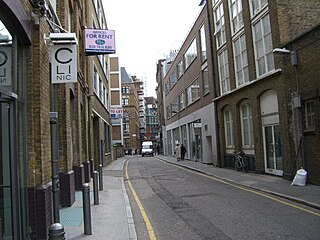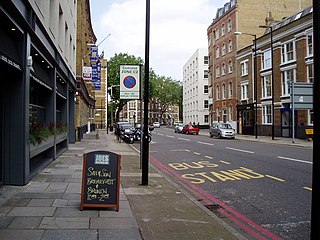
King's Road or Kings Road is a major street stretching through Chelsea and Fulham, both in west London, England. It is associated with 1960s style and with fashion figures such as Mary Quant and Vivienne Westwood. Sir Oswald Mosley's Blackshirt movement had a barracks on the street in the 1930s.

Saffron Hill is a street and former ward in Holborn, in the south eastern corner of the London Borough of Camden, between Farringdon Road and Hatton Garden. The name of the street derives from the fact that it was at one time part of an estate on which saffron grew. The ecclesiastical parish was St Peter, Saffron Hill, a daughter parish of Holborn, which is now combined with St Alban, Holborn.

The Charles Dickens Museum is an author's house museum at 48 Doughty Street in King's Cross, in the London Borough of Camden. It occupies a typical Georgian terraced house which was Charles Dickens's home from 25 March 1837 to December 1839.

The Arts Club is a London private members' club in Dover Street, Mayfair, founded in 1863 by Charles Dickens, Anthony Trollope, and Lord Leighton among others. It remains a meeting place for men and women involved in the creative arts either professionally or as patrons.

Fulham Road is a street in London, England, which comprises the A304 and part of the A308.

Dean Street is a street in Soho, central London, running from Oxford Street south to Shaftesbury Avenue. It crosses Old Compton Street and is linked to Frith Street by Bateman Street.

Old Church Street is a street in London, England in the Royal Borough of Kensington and Chelsea.

Gads Hill Place in Higham, Kent, sometimes spelt Gadshill Place and Gad's Hill Place, was the country home of Charles Dickens, the most successful British author of the Victorian era. Today the building is the independent Gad's Hill School.

Doughty Street is a broad tree-lined street in the King's Cross district of the London Borough of Camden. The southern part is a continuation of the short John Street, which comes off Theobald's Road. The northern part crosses Guilford Street and ends at Mecklenburgh Square. The street is named after a landlord of the area at the time it was built, Henry Doughty.

The George and Vulture is a restaurant in London. There has been an inn on the site, which is off Lombard Street in the historic City of London district, since 1142. It was said to be a meeting place of the notorious Hell-Fire Club and is now a revered City chop house.

Royal College Street is a major thoroughfare in London, England, within the St Pancras and Somers Town ward in the Borough of Camden. The street, which is one-way, is home to the London headquarters of Parcelforce and the London campus of the Royal Veterinary College, a constituent college of the University of London.

Marshalsea Road is a major street in Southwark, south London, England. At the northwest end is the Southwark Bridge Road. At the southeast end is Borough tube station on Borough High Street. Continuing across the street are Long Lane and Great Dover Street. At the northeast corner is the historic St George the Martyr church, where the Charles Dickens character Little Dorrit was married in Dickens' book of the same name. The area around Marshalsea Road has many Dickens associations.

Cadogan Place is a street in Belgravia, London. It is named after Earl Cadogan and runs parallel to the lower half of Sloane Street. It gives its name to the extensive Cadogan Place Gardens, private communal gardens maintained for Cadogan residents. It is owned by Cadogan Estates.

Lant Street is a street south of Marshalsea Road in Southwark, south London, England.

Little Dorrit's Playground, named after Little Dorrit, the eponymous Charles Dickens character, is a public playground and small park just north of Marshalsea Road in Southwark, south London, England.

Onslow Square is a garden square in South Kensington, London, England.

The Parish Church of St Luke, Chelsea, is an Anglican church, on Sydney Street, Chelsea, London SW3, just off the King's Road. Ecclesiastically it is in the Deanery of Chelsea, part of the Diocese of London. It was designed by James Savage in 1819 and is of architectural significance as one of the earliest Gothic Revival churches in London, perhaps the earliest to be a complete new construction. St Luke's is one of the first group of Commissioners' churches, having received a grant of £8,333 towards its construction with money voted by Parliament as a result of the Church Building Act of 1818. The church is recorded in the National Heritage List for England as a designated Grade I listed building. The gardens of St Luke's are Grade II listed on the Register of Historic Parks and Gardens.

The Peacock Inn is a former public house at 11 Islington High Street, London, that dates from 1564.

1–5 and 6 Sydney Place, South Kensington, are a group of large terrace houses situated on the corner of Sydney Place and Fulham Road in London, United Kingdom. Sydney Place leads into Onslow Square. The buildings have been listed Grade II as a group on the National Heritage List for England since 1969.

Kensington New Town is an area of housing in Kensington, London, which was developed in the early 19th century. It lies to the south of Kensington High Street and to the southwest of Kensington Gardens.




















